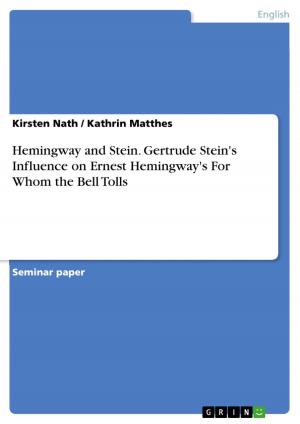Metaphors and implicatures in Shakespeare's 'Much Ado about Nothing'
Fiction & Literature, Literary Theory & Criticism, British| Author: | Achim Binder | ISBN: | 9783640128921 |
| Publisher: | GRIN Publishing | Publication: | August 5, 2008 |
| Imprint: | GRIN Publishing | Language: | English |
| Author: | Achim Binder |
| ISBN: | 9783640128921 |
| Publisher: | GRIN Publishing |
| Publication: | August 5, 2008 |
| Imprint: | GRIN Publishing |
| Language: | English |
Seminar paper from the year 2003 in the subject English Language and Literature Studies - Literature, grade: 2,0, University of Tubingen (Neuphilologie), course: Understanding Utterances, 11 entries in the bibliography, language: English, abstract: For many people it seems that the application and analysis of metaphors only belongs to the field of literary studies. There are, however, such a large number of metaphorical expressions and lexicalized, so-called 'frozen metaphors' in both German and English that the importance of metaphors exceeds by far their poetic usage. For Grice, metaphors result from the flouting of the first maxim (Quality) - that of not saying what one believes to be false. Metaphorical expressions hence provoke a search for the intended speaker meaning because of the obvious discrepancy between the proposition expressed by the utterance and the 'falseness' of its content. This 'falseness', however, is not always clear to see. Take, for example, the metaphor 'no man is an island'. It is obviously metaphorical in both content and meaning and one could deduce a whole range of weak implicatures from it but it is in no way 'literally false'. Considering that Grice labelled tropes and figures of speech (such as tautology, irony and metaphor) as cases of 'maxim exploitation' , it seems reasonable to analyse a text which allows for a maximum of maxim exploitation and whose author is responsible for a large number of frozen metaphors in English: What makes Shakespeare (to name just one example) extraordinary is the way he exploited this ordinary aspect of communication so that a single line or phrase triggers the discovery of a whole array of implicatures. The centre of this paper will thus be a linguistic analysis of metaphors and implicatures in Shakespeare's play Much Ado about Nothing.
Seminar paper from the year 2003 in the subject English Language and Literature Studies - Literature, grade: 2,0, University of Tubingen (Neuphilologie), course: Understanding Utterances, 11 entries in the bibliography, language: English, abstract: For many people it seems that the application and analysis of metaphors only belongs to the field of literary studies. There are, however, such a large number of metaphorical expressions and lexicalized, so-called 'frozen metaphors' in both German and English that the importance of metaphors exceeds by far their poetic usage. For Grice, metaphors result from the flouting of the first maxim (Quality) - that of not saying what one believes to be false. Metaphorical expressions hence provoke a search for the intended speaker meaning because of the obvious discrepancy between the proposition expressed by the utterance and the 'falseness' of its content. This 'falseness', however, is not always clear to see. Take, for example, the metaphor 'no man is an island'. It is obviously metaphorical in both content and meaning and one could deduce a whole range of weak implicatures from it but it is in no way 'literally false'. Considering that Grice labelled tropes and figures of speech (such as tautology, irony and metaphor) as cases of 'maxim exploitation' , it seems reasonable to analyse a text which allows for a maximum of maxim exploitation and whose author is responsible for a large number of frozen metaphors in English: What makes Shakespeare (to name just one example) extraordinary is the way he exploited this ordinary aspect of communication so that a single line or phrase triggers the discovery of a whole array of implicatures. The centre of this paper will thus be a linguistic analysis of metaphors and implicatures in Shakespeare's play Much Ado about Nothing.















